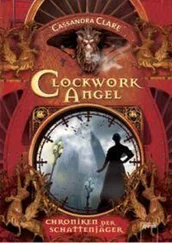There was a seismic shudder far below me, and a long sigh, a wind that blew through the wrecked passageways, running invisible fingers through my hair. I sensed—or imagined—Dhanu’s breath flowing with the breath of the dying City, her consciousness entangled inextricably with that of her host. But as I turned away I knew also that my real reason for abandoning her was that I was the only living being who had the means to bring Hirasor down. For that I couldn’t risk my life.
The roof of the passageway began to collapse. I was running, now, veering from one side to another to prevent being hit by debris. I burst into open air, my chest aching, and flung myself into the flyer. As I rose up, three destroyer bots honed into the very spot I had vacated. I had no time to activate the flyer’s defenses. A great fireball blossomed below me. I felt its heat as I piloted the rocking craft upward through the tumultuous air. Up, in the cool heights, I saw that there was blood flowing down my right arm. My shoulder hurt. I looked down and saw the myriad fires blooming, forming and dissolving shapes that my imagination brought to life. Monsters. And lastly, a woman, arms outstretched, burning.
* * *
In the Ramayan, Ram braves all to recover his consort Sita from the demon Ravan. But near the end of the story he loses her through his own foolishness. He turns her away, exiles her as he himself was once exiled, and buries himself in the task of ruling his kingdom.
All that: the war, the heroes killed—for nothing!
One of the most moving scenes in the epic is at the end of the story, when Ram goes down on his knees before Sita in the forest, begging her forgiveness and asking her to come back to him. She accepts his apology but she does not belong to him; she never has. She calls to her mother, the Earth; a great fissure opens in the ground and Sita goes home.
In the One Thousand Commentaries, there are different views on the significance of Sita. Some interpret her as signifying that which is lost to us. For a long time I had thought of Sita as my world, my childhood. I had seen myself as Ram, raising an army to win back—not those irredeemable things, but a chance for survival. Abandoned by my fellow investigators, hunting for Hirasor alone, I had, after a while, given up on analogies. Certainly I had never thought of Dhanu as Sita.
Dhanu was what I had to sacrifice to reach Hirasor, to rescue Sita. Dhanu had never belonged to me, anyway, I told myself. She could have come up out of the City at any time; it was her obsession with the made-beings that led to her death. Sometimes I was angry with her, at other times, I wept, thinking of the fall of her hair in the moonlight. At odd moments during my renewed pursuit of Hirasor, she would come unbidden into my mind, and I would wonder what her last moments had been like. Had she seen the Universe through the eyes of the dying City? Had she had her epiphany?
But I had little time for regret. My life narrowed down to one thing: find Hirasor. I set various agents sifting through mountains of possible leads; I re-established contact with criminal informers, coaxed or threatened information from scores of witnesses. At night I lay sleepless in my lonely bed, thinking of what I would do when I found Hirasor. My mind ran through scenario after scenario. I had to first put him in a hundred kinds of agony. Then I would say the name of the mother-machine and lock him in Shunyath for ever.
His silence lasted over two years. Then, at last, one of my agents picked up his trail. This time, curiously, it was not marked with blood. No small, artistically arranged orgy of violence betrayed his presence. All I had was proof from a transit shuttle record that he had been headed for the planet Griddha-kuta two months ago.
I went to Griddha-kuta. Apparently he had headed straight for the Buddhist monastery of Leh, without any attempt at covering his tracks. I went to the monastery, suspecting a trap. There, to my angry surprise, I found him gone.
An elderly monk told me that yes, Hirasor had been here. What had he done during his stay? Apparently nothing but walk around in the hill gardens and read in the library. Where was he now?
“He said to tell you that he had gone to Oblivion,” the monk said, watching me. “But why don’t you stay here awhile, before you go? There is no hurry. Hirasor is not running any more. Why don’t you walk the gardens and ease your burdens a little?”
They let me search the grounds and the building, but there was no sign of Hirasor. I wondered if he had really gone to Oblivion, a planet about which I knew little, except that it was as close to hell as you could get among the inhabited worlds. It made no sense that he would go to such an uncomfortable place.
While I was wondering what to do, I walked briefly in the gardens with the monk, Chituri. I told him a little about myself and my quest; in return he confided to me that he had been a world-shell citizen, too, before the fall. His world-shell had been Gilgamesh.
There is no doubt that there was some magic about the place, because I stayed longer than I intended. The gardens in the terraced hills were tranquil, verdant, misty with waterfalls. Amid groves of moss-laden stone trees, pale clusters of flowers hung in the sweet air. Memories of Ramasthal, which had faded with time, returned to me vividly. Meanwhile Chituri tried to persuade me to stay, to give up my quest for justice. As we walked, he would tell me stories from the Indic tradition, even resorting to his knowledge of the Ramayan.
“Don’t you see,” he would tell me, “it is only when Ram forgets the god in him, forgets he is an avatar of Vishnu, that he acts foolishly? What is evil but ignorance of our true nature?”
“You are forgetting that Ravan is the villain of the story, not Ram,” I would say coldly. “If you want to talk about evil, talk about him.”
“But, Paren,” he said, using the name I had given him, “don’t your commentaries say that the entire epic is more than a literal telling of an old heroic tale—that the great battle is really the battle within…”
He had a peculiar way of sidling up to me, of speaking as though imparting a great confidence, and yet his manner was ingratiating, tentative. He hardly spoke above a whisper. I guessed he had suffered much before his arrival here, but I took a dislike to him after a while.
For me this period was, like the time I had met Dhanu, only an interstice, a time to catch my breath before resuming my quest. I was not interested in academic discourses on morality. Chituri did not understand that. He had seen Hirasor walk these very gardens—Hirasor, who had brought down his world as well as mine—and he had done nothing.
I finished my researches on the planet Oblivion, and made arrangements to go there. It was a difficult place to get to, since there was only one settlement, if one could call it that, and only a small scientific research craft visited at rather long intervals. The day I left, Chituri again tried to persuade me to give up my pursuit of Hirasor. He did this in his usual oblique way of telling me a story.
This time it was an ancient Buddhist tale about a murderer called Ungli-maal. Ungli-maal had been a bandit in the time of the Buddha, a man so depraved that he wore the fingers of his victims as a garland around his neck. The Buddha was the only man he waylaid who was unafraid of death, who faced him empty-handed, with compassion. Eventually Ungli-maal—despite all he had been—became a Buddhist monk and a great teacher.
“If you are trying to persuade me that Hirasor has become a saint,” I said between clenched teeth, “you must think me naïve indeed. He is still the man who butchered millions, destroyed countless worlds. He will not escape justice.”
Читать дальше












